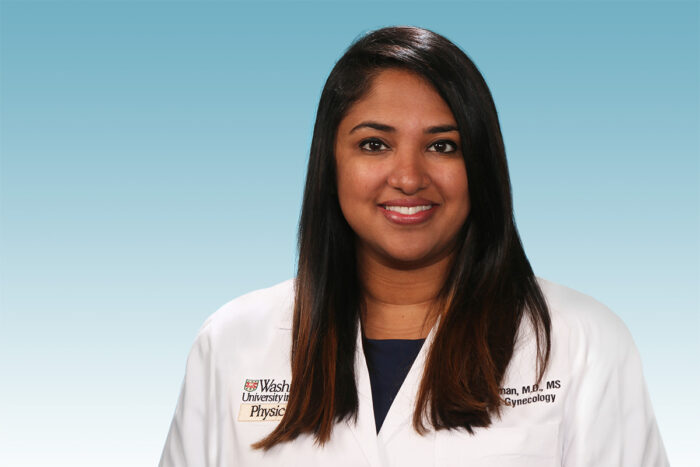Raghuraman named director of clinical research division in OB-GYN
Specializes in high-risk pregnancies, clinical research to improve care
 Washington University
Washington UniversityNandini Raghuraman, MD, has been named director of the Division of Clinical Research in the Department of Obstetrics & Gynecology at Washington University School of Medicine in St. Louis.
Nandini Raghuraman, MD, a physician-scientist who specializes in caring for patients with complex, high-risk pregnancies, has been named director of the Division of Clinical Research in the Department of Obstetrics & Gynecology at Washington University School of Medicine in St. Louis.
“Dr. Raghuraman is an outstanding physician-scientist who has led practice-changing clinical research,” said Dineo Khabele, MD, the Mitchell & Elaine Yanow Professor and head of the Department of Obstetrics & Gynecology. “Not only is Dr. Raghuraman an active clinician in the subspecialty of maternal-fetal-medicine, she also has made fundamental discoveries using state-of-the-art implementation and de-implementation science to improve pregnancy outcomes during labor. She serves as director of the maternal-fetal medicine fellowship. Her outstanding clinical, research and educational expertise contribute directly to improving pregnancy outcomes, especially for patients in labor and for patients at highest risk for complications. I am confident that Dr. Raghuraman will excel in this new role and lead the Division of Clinical Research to even greater heights.”
The Division of Clinical Research supports investigators in OB-GYN and from other specialties who are doing research aimed at improving maternal and women’s health. The division fulfills this mission via collaborative infrastructure, respectful and equitable patient engagement, and rigorous clinical research training, Raghuraman said.
Raghuraman, an assistant professor of obstetrics & gynecology, conducts clinical research that is focused on optimizing care for patients with high-risk pregnancies. Such patients are prone to developing complications that could be life-threatening for the mother, the baby or both. The goal is to reduce maternal and fetal injury and death.
Patients in Raghuraman’s clinical practice often have medical conditions — such as diabetes, high blood pressure or heart disease — that can lead to complications in pregnancy. Similarly, she provides specialized care for the fetus in such pregnancies, including those with genetic conditions or anomalies and a condition called alloimmunization, which can occur when the mother’s immune system attacks the fetal blood cells. She sees patients at Barnes-Jewish Hospital.
Raghuraman’s research focuses on the monitoring of the mothers’ internal contractions during childbirth to assess the relationship between the risk of death for newborns and the resting tones, or the state of relaxation between contractions. She is leading several studies and randomized clinical trials — with funding from the National Institutes of Health (NIH) and private foundations — examining various interventions during labor and delivery. The goal of this research is to identify how to optimize care during childbirth to lower the risks of complications for the mother and newborn.
In 2021, she led important research showing that the decades-long practice of giving supplemental oxygen to mothers during labor did not provide any benefit. The study, in JAMA Pediatrics, showed that infants born to women who had received supplemental oxygen fared no better or worse than those born to women who had similar experiences during labor but did not receive supplemental oxygen. According to Raghuraman, using less oxygen could reduce an unnecessary intervention and likely reduce health-care costs. This work led to a change in national guidelines from the American College of Obstetricians and Gynecologists.
Raghuraman also serves as director of the Maternal-Fetal Medicine Fellowship Program at the School of Medicine and is an associate editor for the American Journal of Obstetrics & Gynecology: Society for Maternal-Fetal Medicine edition.
Raghuraman earned a bachelor’s degree and a master’s degree, both in biology, from the University of Alabama at Birmingham (UAB). She also earned her medical degree at UAB. She completed her residency in OB-GYN at Beth Israel Deaconess Medical Center, affiliated with Harvard Medical School. She joined the faculty of Washington University in 2018, after completing a fellowship in maternal-fetal medicine and earning a master’s degree in clinical investigation at the School of Medicine.






